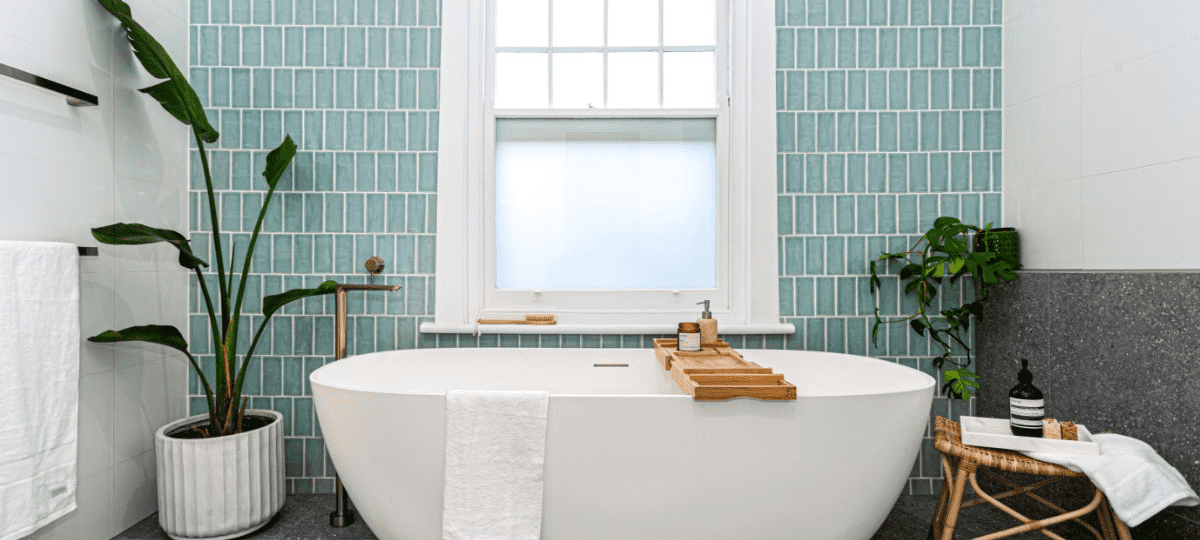Talking Tiles – Choosing tiles for your bathroom
The tiles often set the theme for a bathroom design whether it is as a plain canvas or a striking visual impact. Therefore, getting this right is critical.
So, when it comes to choosing tiles for your bathroom renovation or new kitchen, you’ll be forgiven for feeling a little overwhelmed. With choices in styles, colours, finishes, patterns, sizes and so much more, most homeowners don’t know where to start.
Know the performance requirements.
There are many different types of tiles, designed for different applications and performance requirement. The tiles must be ‘fit for purpose’, so we consider the both the aesthetic and technical factors when we choose. The key factors you’ll be considering are:
- Aesthetics: Shape, size colour, pattern, texture etc.
- Hardness: Impact, wear and water resistance
- Safety: Slip resistance & hygiene
- Ease of care: Surface texture, tile and grout size, maintenance
Don’t worry, we’ll help you.
If you’re one of our clients, we’ll select the tiles with you, either from the shortlisted range in our showroom, or in the glorious showroom of our main tile supplier, Italia Ceramics, whose expert consultants will guide you through the options. In fact, when working with us, that is all you need to know.
Types of tiles
For those who like a bit more detail, we’ve assembled this guide to what you need to know before you go tile shopping.
Modern ceramic manufacturing technology has created a virtually limitless number of colours, sizes, styles, shapes and textures that can add rich beauty and character to any room in your home. Here are some of the main types and their applications and limitations.
Wall tiles
Traditional wall tiles are often referred to as ‘soft biscuit’ tiles. Semi-dried sand/clay is pressed into a mould and kiln fired at relatively low temperatures (700-800 degrees Celsius). A final glaze material (often with a printed pattern) is then applied before a second kiln firing. This type of tiles is usually accurate is size as the clay does not completely melt during firing. They are easy to work with due to their softness, but for the same reason are not suitable for floors. While highly water absorbent, they are suitable for most internal residential wall applications.
Vitrified tiles
Vitrified tiles are produced with a similar process to the soft biscuit, except using higher temperatures (1100 – 1200 degrees C). The higher temperatures result in the clay melting to the point then turns to stone (vitrifies) once cooled down. The result is a tile that is much harder and less absorbent. The downside to this process is that the base (biscuit) of the can warp, twist and change size at the higher temperatures.
Porcelain tiles
Porcelain tiles (sometimes called fully vitrified) have a different clay composition and typically fired at 1200-1400 degrees. They are very strong and are highly impervious to water, which makes them perfect for use in a bathroom renovation. Porcelain tiles can be unglazed with a polished, natural or textured finish. Alternatively, if glazed, they can be gloss, matte or textured. Semi-polished or ‘lappato’ finish is a textured tile that has been polished to a sheen while maintaining some of the texture and ruggedness.
Natural stone tiles
Natural stone tiles are typically marble, limestone, travertine or granite. As beautiful natural materials they have long been popular in high-end projects. They require more care in laying, with additional maintenance and care after installation. In bathrooms they have largely been replaced by porcelain tile imitations.
Glass tiles
Glass tiles come in a wide variety of shapes, colours and sizes and are most often used in mosaics to create a visual feature as a contrast to main materials.
Terracotta tiles
Terracotta (baked earth) tiles are generally soft due to low firing temperatures and are unglazed. Because they are porous, most are unsuitable for bathroom application, as even when sealed they absorb water.
Other materials
Other materials include metal finishes, which can be created as solid material or as a coating on a tile or resin base. Popular finishes include stainless steel, copper, bronze and even gold plating.
Additional options exist to include metal tiles which can be created from solid metal or resins with a metallic coating to create finishes in bronze, copper or stainless steel.
Latest manufacturing methods for porcelain and ceramic tiles are now producing imitations that have the appearance of natural stone with the with all the benefits of ceramics, including much lower costs. Additionally, tile imitations of timber, concrete and many other finishes create an almost limitless amount of choice.
Too Hard? Fear not!
You have access to all the experts in our team: Interior, building, bathroom and kitchen designers, several tilers and stone mason, as well as our supplier’s team at Italia Ceramics. We will guide through the options and make the best choice for your home.
Want to learn more about tiles?
Come in and speak to our dedicated Bathroom Designers who have expert knowledge of the newest and exciting tile products. Come and visit our bathroom showroom where we feature the best and latest in bathroom brands and design.
To see some examples of some of the best bathroom renovations Adelaide has to offer, take a peek at our portfolio page. Whether you are looking for a modest or majestic, we have the right solution for you. Contact us today to find out more about bathroom renovations or to discuss tiles with us.


